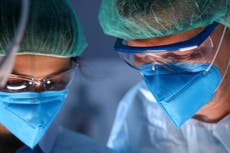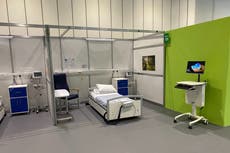NHS calls in military to help shore up understaffed intensive care wards
Exclusive: At least 350 soldiers to be deployed to NHS trusts as nurse leaders warn staff-to-patient ratios are dangerous

Hundreds of soldiers are to be sent into major London hospitals to help shore up understaffed intensive care units as the numbers of coronavirus patients in the capital has risen again.
The Independent has learned 200 medical combat technicians will be sent into intensive care units at the city’s main trusts including the Royal London Hospital in Whitechapel, east London, and the Royal Free Hospital in Hampstead, north London.
Another 150 military staff will be put into non-clinical roles to help free up nurses and doctors to keep caring patients. The move follows a request for aid from the NHS.
The city’s hospitals are in a staffing crisis with the latest data from Thursday showing almost 15,000 staff across London are off sick from work, with 60 per cent of the absences linked to Covid-19. This includes more than 6,100 nurses and 789 doctors. Nursing bodies have also issued a warning over hospitals stretching nurse to patient ratios to unsafe levels in intensive care wards.
Meanwhile the number of coronavirus patients in the capital keeps rising, reaching a new record of 7,840 on Thursday, an increase of 154 in a day. Across England there were 32,925 Covid patients in hospital.
A leaked email reveals soldiers will be drafted in to liaise between patient families and clinicians, help with ward activities and carry out roles such as moving patients and equipment around hospitals.
Hospitals have been asked to identify what they need this week ahead of soldiers being deployed from Monday under a formal military aid to civil authorities request by NHS England.
In a message to hospitals, on Wednesday, from NHS Professionals, a limited company owned by the Department of Health and Social care to source extra staff for NHS trusts, hospitals were told the Ministry of Defence was looking to send in personnel to perform “general non-clinical duties to support clinical services.”
It added: “We want to deploy as many additional resources as possibly to build into your teams to reduce the current burdens faced by your clinical workforce. Our role will be to deploy as many requested military personnel to your trust starting from Monday 18 January.”
The staffing situation in some London hospitals is so bad staff are being asked to work extra shifts in intensive care.
At the Royal Free Hospital bosses have issued repeated urgent appeals for staff to work in it’s intensive care unit. A message seen by The Independent said: “We urgently need staff that are available to work clinically over the coming days — night shifts and weekends are especially needed.”
Despite the pressures on hospitals, the newly opened Nightingale Hospital, in East London, had just three patients on Thursday, despite opening on Monday with 64 beds available.
Across the country, hospitals are facing similar problems in intensive care where the numbers of patients far exceed the normal numbers of critical care beds. In most hospitals, operating theatres are being used as intensive care wards with nurse to patient rations being stretched to dangerous levels.
Nursing bodies agreed to allow nurse to patient ratios, which are normally 1:1, to stretch to 1:3 during the pandemic in November. But this is already being breached prompting a warning from the UK Critical Care Nursing Alliance.
It said: “Bedside nurse to patient ratios are already deteriorating beyond those set out by national pandemic guidance documents. Further dilution of bedside nurse to patient ratios should only happen in exceptional circumstances where there is a need to expand capacity despite escalation to regional and national critical care networks and when all local and regional mutual aid options, including inter-regional assistance, have been exhausted.
“Ratios must be returned to normal as soon as practicable as these staffing levels are unsustainable for nurses’ well-being and for patient safety.”
It also warned that redeployment of staff was no longer viable in some hospitals.
The Nursing and Midwifery Council today said it would allow final-year nursing student to opt in to working on paid clinical placements in hospitals to help hospitals during the pandemic.
The Royal College of Nursing chief executive, Dame Donna Kinnair, said on Thursday: “With each day, a smaller number of staff is asked to look after a greater number of patients.
"Ministers must make an urgent statement on the viability of services."
NHS Providers, which represents hospital trusts suggested students should see a reduction in their third year fees of £3,000 funded by the government.
Chief executive Chris Hopson, said: “Everyone would have wanted to avoid asking third year nursing students to help at the NHS frontline again, particularly since they were asked to help out in the first phase, in their second year. But the NHS is now in an incredibly serious situation.
“Trust leaders believe that the least the government can do is financially recognise the contribution we are asking these student nurses to make. This would also help maximise the number of people volunteering.”
NHS Professionals said it was not allowed to comment and referred The Independent to NHS England, which declined to offer any information.
Join our commenting forum
Join thought-provoking conversations, follow other Independent readers and see their replies
Comments



Bookmark popover
Removed from bookmarks